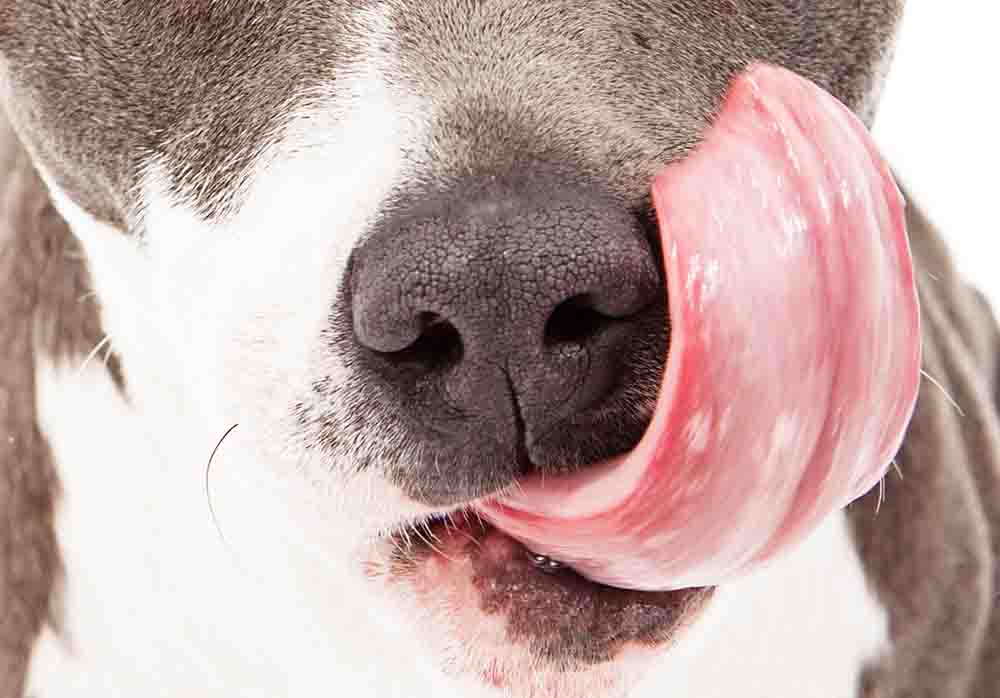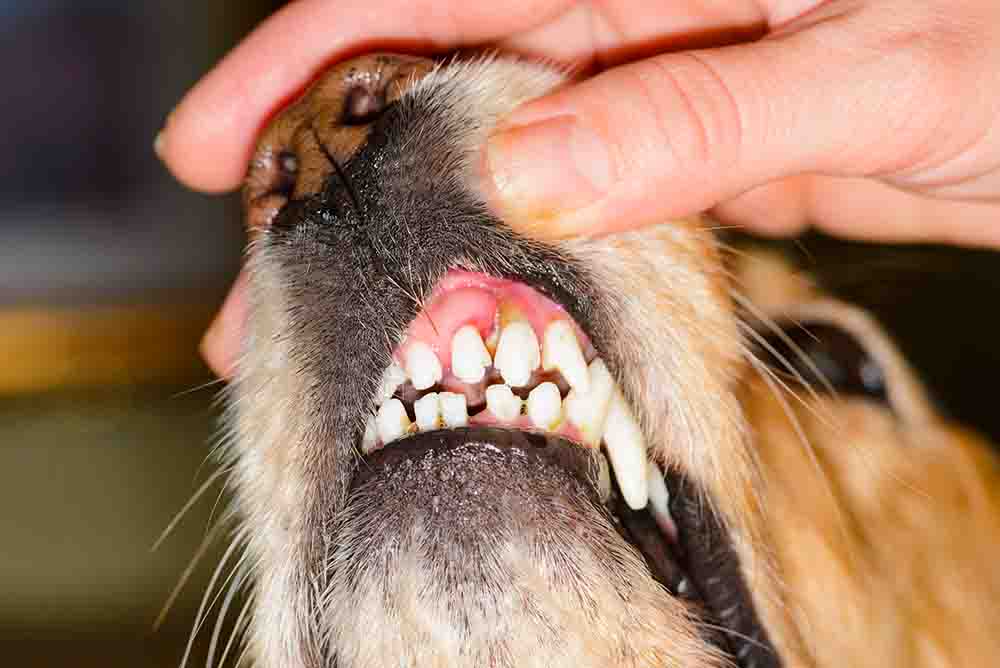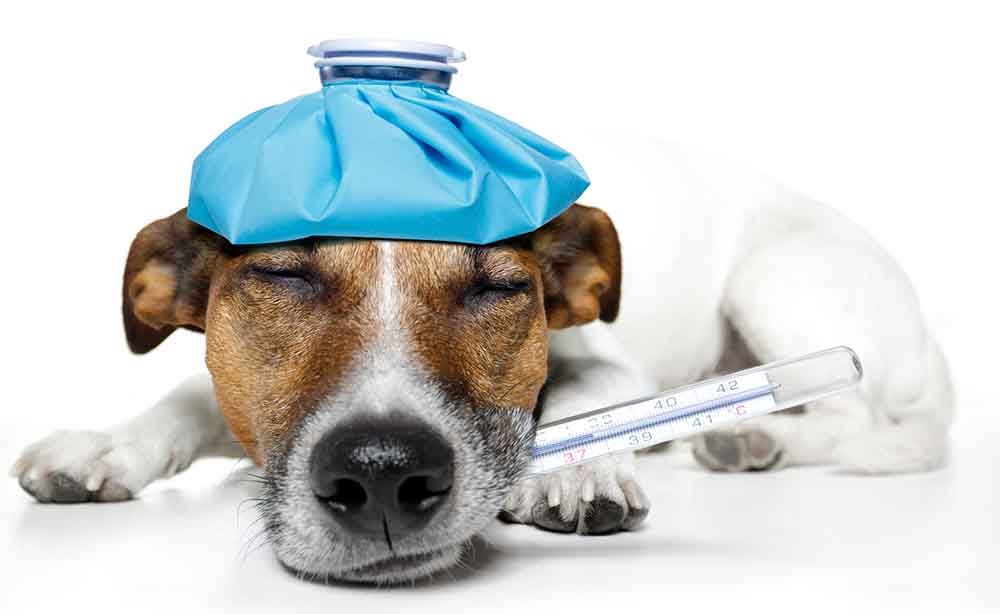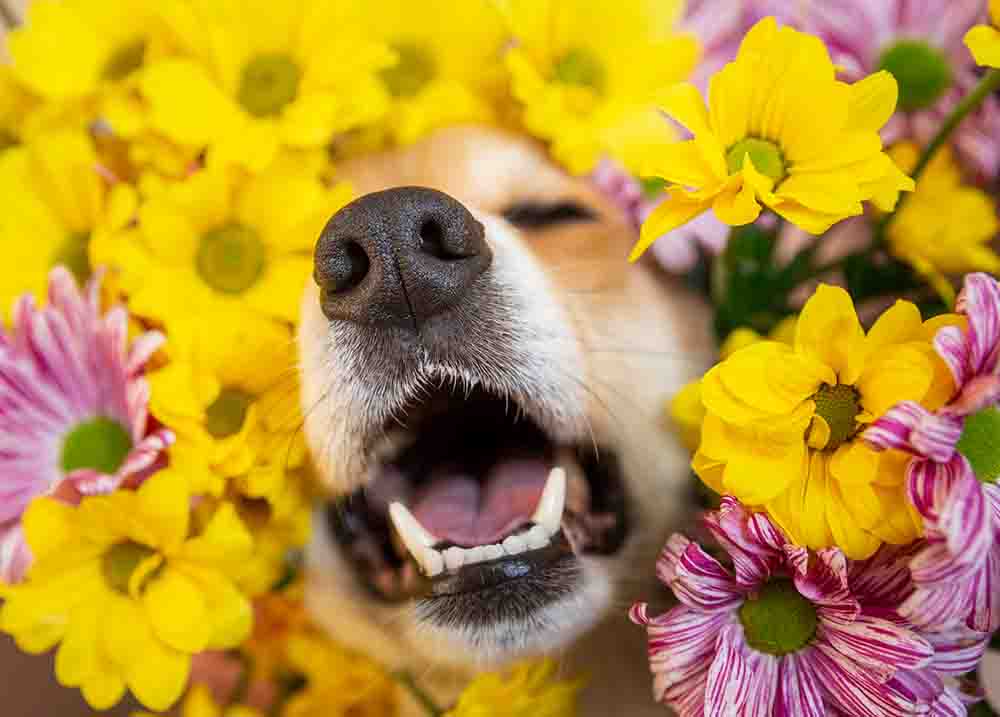
This article was updated on May 1st, 2023

A dog that keeps sneezing is a common issue and one that we often encounter in our veterinary practice. One such dog that I recently treated for excessive sneezing was Cindy – she couldn’t stop sneezing, it was almost constant. It turned out that a grass seed had become wedged up her nose. I removed it and Cindy was instantly cured.
Some causes of a dog sneezing are nothing to worry about, and can be addressed quickly, while others may indicate the presence of a more serious medical condition. The following article describes when you should be worried about your dog’s sneezing, what the most common causes are, and what you can do to help stop your dog’s excessive sneezing.
When Should I Be Worried about My Dog’s Sneezing?
We consider a dog sneezing more than 3-4 times each day, on separate occasions, as excessive since it might signal a more serious issue. Of course, it can be normal for a dog to sneeze once or twice a day; we know ourselves that there are some situations when you just can’t help it. However, if your dog is sneezing too often, uncontrollably, violently, or if they have other symptoms with sneezing, you should visit your veterinarian.
If your dog is only sneezing 2 or 3 times in a day, and is generally well in themselves, it is probably nothing to worry about.
If the sneezing is accompanied by other symptoms, such as lethargy or fever, you should take them to your veterinarian. Below is a list of possible accompanying symptoms that could be indicative of a more serious medical condition:
- Lethargy
- Excessive nasal discharge
- Nose bleeding
- Vomiting or diarrhea
- Inappetence
- Nasal swellings or asymmetry of the face
However, it’s important to realize that these symptoms may not always appear even if your dog has a new medical condition.
If your dog suddenly develops a nosebleed that won’t stop then you should take them to the vet immediately, even if it means going to the out of hours vet in the middle of the night.
How to Help a Dog Who is Sneezing a Lot
To find the best remedies to help your sneezing dog, you first need to understand what is causing it. Based on medical studies and our own veterinarian experience, we have compiled a list of the most common reasons causing dogs to sneeze excessively, along with some tips on how to help your dog:
1. Rhinitis (est. 15-25% of cases)
This is a common cause of excessive sneezing in dogs. Rhinitis occurs when the lining of the nose becomes inflamed and irritated. This is usually caused by an infection, but sometimes it can be triggered by other things like allergens and irritants. Sneezing may be due to rhinitis if you also notice nasal discharge, nose bleeding, or swelling of the nose.
What can you do? You should take your dog to the veterinarian as it is likely that anti-inflammatory medication is required.
2. Foreign Body in Your Dog’s Nose (est. 5-10% of cases)

A nasal foreign body can also cause sneezing. This happens when the dog inhales a foreign object, such as a grass seed. Sneezing may be due to a foreign body if your dog is constantly sneezing, has nasal discharge (especially if it’s from only one nostril), and swelling of the nose.
What can you do? To find out if there is a foreign body, you should take your dog to your veterinarian. They can use x-rays and nasal endoscopy procedures to find and remove foreign objects. In the case of Cindy that was brought up earlier, Cindy had spent the afternoon running off the lead in the fields near her house and had suddenly developed an aggressive sneeze. Cindy was clearly very distressed, and something up her nose was causing her great irritation. A little sedation and examining her nose with a small camera scope revealed a long grass seed. It had clearly become wedged up her nose while she was enjoying running around. I removed it, and Cindy was cured right away.
3. Periodontal disease (est. 5-10% of cases)
Severe dental disease can lead to tooth root abscesses. Due to how close the upper teeth roots are and the nasal cavity, any inflammation or infection can easily push through into the nostrils and sinuses. This results in sneezing.

What can you do? Medication can help in the short term but it’s likely that your dog will need a dental procedure to correct the issue. Take your dog to the vet.
4. Fungal infection (est. 5-10% of cases)
A fungal infection called Aspergillosis is another possibility, although less likely. Your dog will often have nasal discharge and be unwell if this is the case.
What can you do? You should take your dog to the veterinarian, who will most likely want to take samples to culture for the fungus. Treatment can then be started.
5. A Virus such as Canine Influenza (est. 1-10% of cases)
If your dog has other symptoms, such as a hacking cough, sudden lethargy, excessive discharge from the eyes or nose, or a high temperature, they might have picked up canine influenza. Read our article on how to tell if your dog has fever.

What can you do? Please contact your veterinarian as soon as possible. If canine influenza is not treated properly, it may develop into pneumonia or another more serious condition.
6. Environmental allergies (est. 1-10% of cases)

Allergies can be triggered by things like dust mites and pollen. Sneezing may be due to allergies if you also notice that your dog has skin symptoms such as redness, itchiness, or hives or if your dog is mostly sneezing when going outdoors.

What can you do? Your veterinarian can test your dog for allergies. This will help you determine the best treatment option, which could be allergy medication (or steroids for serious allergy symptoms). In the meantime, you can also keep indoor surfaces clean by regularly vacuuming and dusting. Also, be sure to clean your dog’s bedding weekly. Learn more about dog sneezing due to allergies.
7. Food allergies (est. 1-5% of cases)
Food allergies are a rare but possible cause of excessive sneezing in dogs. The symptoms usually appear after your dog has eaten the food allergen for a number of weeks, so it’s important to keep track of changes in your dog’s diet. Sneezing may be due to food allergies if you also notice that they have other symptoms such as diarrhea, itching, or even vomiting.
What can you do? If you think food could be the cause of sneezing, then speak with your veterinarian about switching foods; a hypoallergenic diet is usually recommended.
8. Tick or Flea Infestation (est. 1-10% of cases)
If your dog has a tick or flea infestation, then these pests can irritate your dog’s body and trigger a persistent sneezing episode – especially if they get up the nose as well.
What can you do? Make sure to keep on top of your dog’s flea/tick prevention.
9. Tumors
Tumors within the nasal cavity may also cause excessive sneezing. Although these tumors are rare, it’s important to be aware of this possibility, especially if your dog is elderly.
What can you do? Your veterinarian will first need to examine your dog, followed by possible imaging with X-rays and/or endoscopy.
More info can be found in this study.
Additionally, occasional sneezing can also be due to over-excitement. If your dog is only sneezing when greeting you or when playing a game. Dogs often curl their lips while playing a fun game, which can cause harmless sneezing. This is probably the reason, and it is usually not a cause for concern unless your dog also shows other symptoms.
Are Certain Dog Breeds More Prone to Sneezing Excessively?
Brachycephalic (flat-faced dogs), are more prone to sneezing due to the anatomical compression of their nasal passages – this includes bulldogs, pugs, Pekingese, Boston terriers, and English bulldogs.
Be sure to be extra vigilant if you own one of these breeds and they start to sneeze.
What Questions Will My Veterinarian Ask Me?
Make sure you take note of any other symptoms that could indicate something is not right with your dog and talk to your veterinarian just to be on the cautious side.
Your veterinarian will want to know more about the symptoms and any possible causes of the sneezing. Be prepared for questions like:
- How many times is your dog sneezing a day? how often?
- Have you noticed any discharge from your dog’s nose? What does it look like?
- Did you feed your dog anything unusual before he started to sneeze?
- Can you think of any reason why your dog may have inhaled something irritating?
- Does your dog have allergies?
- Is there a plague of ticks or fleas in your home?
- Has anything changed in your dog’s environment recently?
Is There Anything I Can Give My Dog to Help? Any Home Remedies?
Home treatment options are limited when it comes to a dog excessively sneezing, depending on the cause. However, there are some things an owner can do to reduce the likelihood of a dog sneezing at home:
- Don’t change your dog’s food too often
- Try to avoid letting your dog run off the lead through grass fields
- Don’t use any aerosols or fragrance diffusers around your dog
Disclaimer: This website's content is not a substitute for veterinary care. Always consult with your veterinarian for healthcare decisions. Read More.


Thank you for this informative post! My dog has started sneezing frequently, and I was worried it might be something serious. I appreciate the practical tips and your advice on when to seek veterinary care. I’ll be watching her symptoms more closely now!
Thanks for this informative post! I never knew that sneezing could indicate allergies or even nasal issues in dogs. I’ll definitely keep an eye on my pup and look out for any other symptoms. It’s always good to know when to consult the vet.
Thank you for this informative post! My dog started sneezing unexpectedly, and I was really worried. It’s comforting to know there are common reasons for this. I’ll definitely monitor his behavior and consider checking with my vet if it continues. Appreciate the tips!
Thank you for this informative post! My dog started sneezing a lot recently, and I was really worried. It’s good to know there are various reasons for it, and the tips you provided are super helpful. I’ll definitely keep an eye on her and consult the vet if it continues.
Thank you for this informative post! My dog just started sneezing a lot, and I was getting worried. I appreciate the tips on monitoring symptoms and knowing when to consult a vet. It’s always helpful to have clear guidance during these situations!
Thank you for this helpful information! My dog just started sneezing a lot, and I was really worried. It’s reassuring to know there could be various reasons for it, and I’ll definitely keep an eye on her symptoms. I appreciate the vet’s advice on when to seek help!
Thank you for this informative post! My dog has been sneezing a lot lately, and it’s been concerning. I appreciate the tips on when to visit the vet and how to check for allergies. I’ll definitely be more attentive to his symptoms!
Both of my dog are sneezing more than did last year. I haven’t seen any discharge and they are eating well and doing everything they usally do. I will talk to the vet at their next appointment.
Thanks for the informative post! My dog started sneezing a lot lately, and I was really worried. I appreciate the tips on what to look for and when to see a vet. Definitely feel more prepared now!
Thank you for this informative post! My dog has been sneezing quite a bit lately, and I was starting to worry. I appreciate the tips on potential causes and when to seek veterinary help. It really helps to know what to look for!